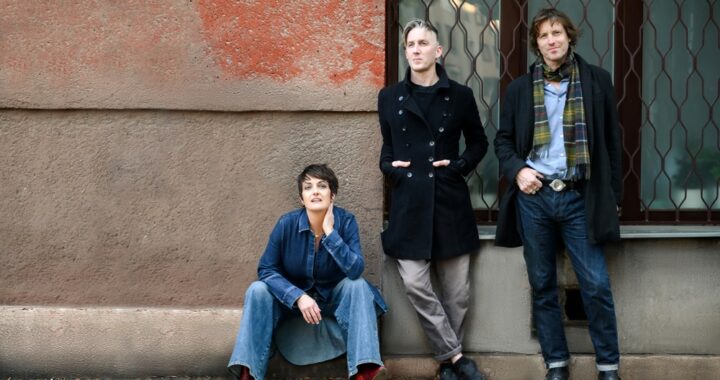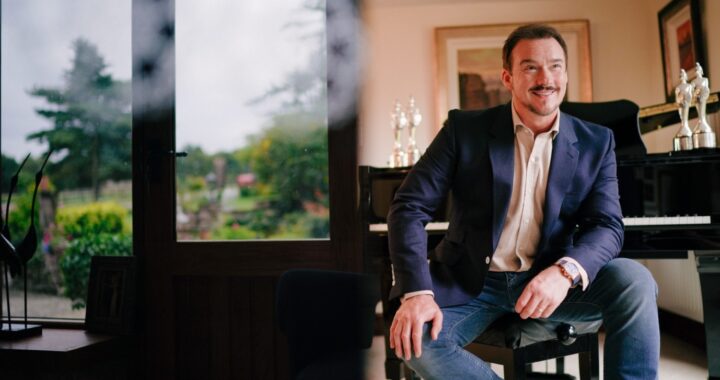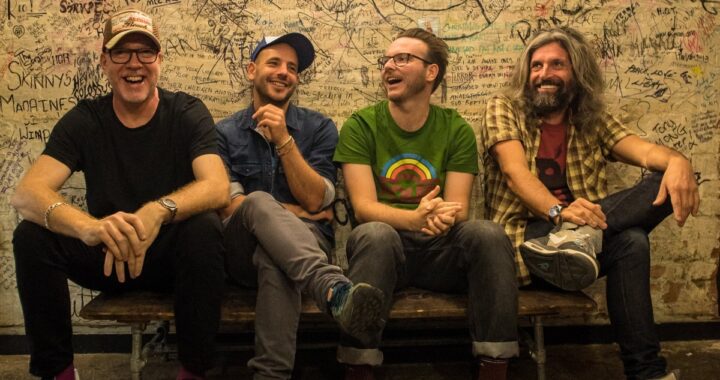Interview: The Jezabels
12 min read
The Jezabels have come a long way since their first formation as a band in 2007. Joining forces during their time at the University of Sydney, the four-piece quickly fell into an indie rock groove, where they’ve resided for the past nine years, and have spun out three dynamic studio albums. An ARIA award win, multiple nominations and appearances everywhere from Splendour in The Grass to Lollapalooza are just a few accomplishments sitting under their belt. Now, after months of anticipation, The Jezabels’ third release Synthia has arrived – a collection of emotive, cinematic rock designed to provoke and question the role of women.
On day of Synthia’s release a very excited but humbled Nik Kaloper, drummer of The Jezabels, chatted to us about creating a more theatrical album, feminism and what it was like for the band having to cancel their national tour in response to fellow bandmate Heather Shannon’s illness. This is what he had to say…
 Debbie Carr: Congratulations on the release of Synthia today! How are you feeling about it?
Debbie Carr: Congratulations on the release of Synthia today! How are you feeling about it?
Nik Kaloper: Oh it’s great! I mean we always have that awkward period from finishing it so we can just organise everything to release it, but we’ve been with it for a while and it’s always a massive release just to get it out there for people to listen to.
DC: Oh I can imagine! Does it get any less exciting with each album?
NK: No, God no! Every album feels new in the sense you’re trying to take a step forward from whatever you’ve done previously. So it’s always sort of exhilarating in its own right, being its own work, compared to everything else you’ve done I guess.
DC: Do you feel any pressure with this third album?
NK: No, if anything I feel completely liberated from all forms and sources of pressure this time round. It feels really really good just to have written something and [then] chuck it out there.
DC: So if you could sum up Synthia in one word, how would you describe it?
NK: Oh God [laughs], that’s really hard. Music, probably? It’s a lot of things. If I ever try to explain anything I use a lot more words than most people would, so the one word question with me will always fall flat I’m afraid. You’re only going to get the horribly clinically answered ‘music’ from me.
DC: Well, I mean at least in saying ‘music’ you’re technically not wrong, it’s not a terrible way to describe it. So if you would prefer to expand a little bit, how would you describe this album in more than one word?
NK: I guess I’d describe it as… It’s so hard because we never know what it’s going to be until it’s done and you sort of look back on it and think about what you’ve done, what you’ve made. I guess the description I like the most about it is that we’ve gone back to somethings we were trying to do earlier in our career. We’ve tried to explore that a bit more. In a way I see it as a return to some ideas we had previously about music but sort of trying to expand on those. I do like how much more dramatic it is than most of anything else we’ve released. I think dramatic is definitely a word you can chuck in there.
DC: That was actually something I was going to ask you about. The album seems a lot bigger, even bordering on theatrical, this time. Was this something you consciously decided to do for this album or did it just happen?
NK: No I think that’s just what happens when the four of us are in a room together. A lot of people are great at writing music and being minimalistic and trying to figure out how to make less more but I think we’re always trying to figure out how to make more more, if that makes sense, when we write our songs; that’s one thing that appeals to us. I honestly think that if any single member of our band was different musically, we’d definitely be different. And probably in a substantial way, not in a minor way.
DC: What was it like making this album? What was the process like this time round?
NK: It was interesting. The story is basically we got together after taking some time off after The Brink tour to rehearse for an upcoming festival we were playing and we thought oh what the heck let’s just book a few extra days in the studio to try at song writing…then if something happens we’ll make sense of it. Before we knew it, we started writing probably more quickly than we ever have in our careers, which is very unnatural for us because tend to write very slowly and labour over things quite a lot. All of a sudden we had maybe four songs and we thought oh here we go again [laughs] let’s just go for it. It seemed like we’re all sufficiently inspired and compelled to make more music together. That was the best part of it, that there was zero pressure to do that, like we could’ve walked away from it forever or given it another 6 months and come back to it but I think that was the best part of the whole process of writing the album. It really felt like it was coming from us and no other external forces. Then recording it is the same as ever – we sit in the studio for ten hours a day just labouring over every single agonising little detail.
DC: Is there someone in the group who’s a real perfectionist about things or is it a team effort?
NK: It’s very much a team effort and I’d say we’re all perfectionists. Sometimes you get tired and you’re going over this pre-chorus whether it needs to be twice as long or half as long for a whole day, then the next day you come back into the studio and listen to it and you’re like oh its fine I don’t know what we were thinking about, let’s just move on. We’ll have another whole day to work on an eighth of the song but whatever, that’s how we work.
DC: Sometimes you just need to go back in with a fresh mind and try not to go crazy during the recording process.
NK: Yeah definitely! With drums it’s funny because I’m always the first to go down, and just in a practical manner it’s hardest to sort of re-record because typically these days you’re in a different studio to track drums so you have a lot more space and a lot more gear. I’m the first to commit all my parts down. Then Hayley, Heather and Sam might have some inspired ideas on top of the song and I’m like oh if I knew that was going to happen [I would] go back and sort of rejig my drums a little bit just to make it fit. It’s hard because my parts tend to go down first and stay pretty unchanging so I’ve got to commit quite a bit from the very beginning.
DC: So is that when you feel the pressure then?
NK: Yeah, I put a lot pf pressure on myself frankly, hopefully it’s productive. It’s not always a productive pressure but it gets the job done one way or another.
DC: Is there a particular track on the album that’s your favourite?
NK: Yeah actually! Speaking of agonising over parts, I really like the song Unnatural on the album because that song had about four or five different manifestations before we committed to that version of the song. When you’re writing you’re sort of trying to figure out… you can have a song but it feels like a whole bunch of different ways you can express the same song. And sometimes it just makes sense like there’s this one way to do it, but with other songs it feels like there’s a range of ways to get that song across. At one point we had the verses in a compound time signature, which was sort of weird, and so we decided to try a drum and bass beat in the chorus and it was sort of weird [too]. I like it because we preserved and settled on its final formation.
DC: That sounds like it would be so worthwhile to sit down at the end and hear the final product. Did all of you in the band get together one day and just listen to the album in full?
NK: We do it privately but we don’t sit around together and listen to it in full. I find my favourite listening time in on a train actually. Sometimes I’ve taken train rides just for the purpose of listening to music perfect for sitting on a window seat on the top deck of the carriage and staring out the window listening to music, so I’ve done that with this album to make sure I like it! It went well.
[youtube id=”dMV_O_z6-6U” width=”620″ height=”360″]
DC: Was there anything that didn’t make Synthia’s final cut? Do you ever finish an album and end up with a lot of material on the side that didn’t quite make it?
NK: No, not a lot of material; not as much as other bands. I’ve heard, for instance, of bands having upwards of 40 or 50 tracks and then choosing from those tracks, which is not us at all. We typically only write enough and again it’s because we labour over it so much, we only have time to meet our quota of the number of tracks we need to make up a good album. We [only] had a couple of tracks on the side and it was good because at one point we had what we thought would be the album and after listening to it all the way through and feeling like…and kind of judging the flow of the highs and lows, we realised it faded out a bit too much at the end. We went back in the studio and recorded a few songs and that’s how we got track nine If Ya Want Me, that was from thinking maybe we need more energy towards the end of the album so you don’t lose interest. We’re not ones for petering out at the end, we still wanted a couple of high energy tracks in the back. So we re-recorded a few more songs and chose one of those songs to sneak in on the back path of the album.
DC: I saw that Hayley said that natural momentum played a huge part in making this album. What is the best way you find to stay inspired and stay motivated throughout this long process?
NK: Yeah there is a natural momentum. The only time you really need to find a way to re-motivate yourself is when you start to doubt yourself, other than that the motivation is always there. I for one cannot start something without finishing it, and I think we’re all a bit like that. If somethings started it’s getting finished come hell or high water. So I think that momentum and that motivation came from the fact we all thought well we’re making an album so let’s make it, but you know you have those days where you get into the studio just doubting yourself a bit and just thinking shit how am I going to make this sound better or make a part sound great to me that I can feel proud of. It’s just all you can do is make sure you go in there and try. You just have to force yourself to go in because as much as you might not feel like it, [if] you’re sort of worried about it…you just have to tell yourself to shut up and just get in there and at least tomorrow might not be as useless.
DC: Is there anything you do to avoid burning out or overworking?
NK: Sometimes I think it’s good, you know, if I feel like I’m underworked I start to question myself like you know you haven’t worked hard enough so how badly do you actually want this. I think you can feel burnt out when you start overthinking stuff and in that case you definitely need to change something up. We went up to the Blue Mountains to just rehearse and write for a bit up there and it was really good to just change the environment. I think you don’t get burnt out if you make sure you have a few variables you can change up a few times – whether it’s just someone else taking the reins for the day or changing your environment a little bit.
DC: Synthia seems to have a very feminine quality to it. Where did this stem from?
NK: Definitely Hayley motivates all the lyrics and the content. She tries to put a face on the music, then Heather and I write, but she has a big hand in the song writing process as well. I mean the band as a whole has always been interested in gender politics and I think it’s a great thing, I really like Hayley’s lyrics to be honest. I mean there’s not so much I can do to get feminism or politics across in my drumming so it’s up to Hayley and I’m pretty happy to drum to support those messages.
DC: Does the band have a stance on where they feel the role of a female in the music industry is going to head in the future?
NK: I think it should just be the same as every industry in the world as far as gender equality is concerned. We definitely have women dominating the commercial pop world, I think, over men in a way but I don’t think it’s as simple as just looking at number one singles. I think it’s about the treatment of women in music and being seen as more than women, as actual artists. For so many female artists, to me, it sometimes seems like they’re a female before they’re an artist but for men they seem to be an artist before they’re a male, if that makes sense. So just reversing that a little bit in [the] struggle with gender equality. I think it’s not just anything isolated to music industry obviously, but it’s something that’s very broad and needs to be looked at from a number of different of angles to have an effect on those industries. That’s a very convoluted answer there for you.
DC: The other thing I just wanted to touch on was Heather. How is she doing at the moment?
NK: Without going into specifics, she’s definitely a strong woman and she’s fighting it really hard, getting some strong treatment at the moment. As far as Heather goes she’s an absolute trooper, really positive the whole time, and frankly an incredibly strong women who I look up to for that. So she’s doing as well as anyone in her position could be doing, which is great.
[youtube id=”zoLWLsO-ApQ” width=”620″ height=”360″]
DC: That’s good to hear, she seems like a very strong woman who has an incredible support system around her. How is the rest of the band feeling about everything?
NK: We’re feeling good. We’ve been friends for eight years so we’re obviously going to be involved in certain aspects of each other’s personal lives and I think for all four of us equally the only real shock as far as the band itself was we were very disappointed to have to cancel the tour that was going to be supporting this album but it’s for every obvious and necessary reasons of course. That was a bit of a hurdle to jump but all of us have been as good as you can be with dealing with it. It’s just making sure Heather has everything she needs and she’ll battle it out like a trooper.
DC: Well this is definitely a situation where I’m sure everyone understands why that had to be done. Aside from Heather’s recovery, does the band have any main goals for the year ahead and things you’d like to achieve?
NK: As a band, probably not so much to be honest. It’s just a real waiting game and we’re obviously going to continue to interact with our fans and if we do anything we’ll let people know about it. For the moment it’s just going to be a proper hiatus from our end because we’ve got bigger fish to fry frankly. So as a band we won’t be doing anything but the four of us will always be looking to further ourselves musically in some way shape or form, so that the next time we get back together as a band we can be as strong as possible.
The Jezabels brand new album Synthia is out now.



